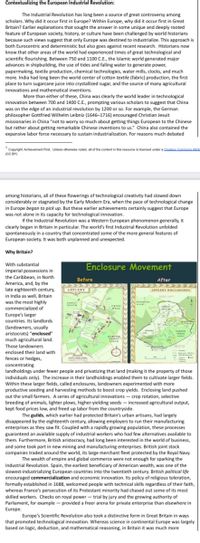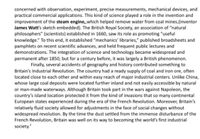Question
thumb_up100%
Based on the source, what were the causes of the French Revolution?
This is history.

Transcribed Image Text:Contextualizing the European Industrial Revolution:
The Industrial Revolution has long been a source of great controversy among
scholars. Why did it occur first in Europe? Within Europe, why did it occur first in Great
Britain? Earlier explanations that sought the answer in some unique and deeply rooted
feature of European society, history, or culture have been challenged by world historians
because such views suggest that only Europe was destined to industrialize. This approach is
both Eurocentric and deterministic but also goes against recent research. Historians now
know that other areas of the world had experienced times of great technological and
scientific flourishing. Between 750 and 1100 C.E., the Islamic world generated major
advances in shipbuilding, the use of tides and falling water to generate power,
papermaking, textile production, chemical technologies, water mills, clocks, and much
more. India had long been the world center of cotton textile (fabric) production, the first
place to turn sugarcane juice into crystallized sugar, and the source of many agricultural
innovations and mathematical inventions.
More than either of these, China was clearly the world leader in technological
innovation between 700 and 1400 C.E., prompting various scholars to suggest that China
was on the edge of an industrial revolution by 1200 or so. For example, the German
philosopher Gottfried Wilhelm Leibniz (1646-1716) encouraged Christian Jesuit
missionaries in China "not to worry so much about getting things European to the Chinese
but rather about getting remarkable Chinese inventions to us." China also contained the
expansive labor force necessary to sustain industrialization. For reasons much debated
*Copyright: Achievement First. Unless otherwise noted, all of the content in this resource is licensed under a Creatin Commons Attrih
(CC BY)
among historians, all of these flowerings of technological creativity had slowed down
considerably or stagnated by the Early Modern Era, when the pace of technological change
in Europe began to pick up. But these earlier achievements certainly suggest that Europe
was not alone in its capacity for technological innovation.
If the Industrial Revolution was a Western European phenomenon generally, it
clearly began in Britain in particular. The world's first Industrial Revolution unfolded
spontaneously in a country that concentrated some of the more general features of
European society. It was both unplanned and unexpected.
Why Britain?
With substantial
Enclosure Movement
imperial possessions in
the Caribbean, in North
America, and, by the
late eighteenth century,
in India as well, Britain
was the most highly
Before
After
APPLEBY
APPLERY ENCLOSURES
MEATH
commercialized of
CROSS
WELL
Europe's larger
countries. Its landlords
(landowners, usually
aristocrats) "enclosed"
much agricultural land.
FILD
Those landowners
enclosed their land with
fences or hedges,
concentrating
landholdings under fewer people and privatizing that land (making it the property of those
individuals only). The increase in their landholdings enabled them to cultivate larger fields.
Within these larger fields, called enclosures, landowners experimented with more
productive seeding and harvesting methods to boost crop yields. Enclosing land pushed
out the small farmers. A series of agricultural innovations – crop rotation, selective
breeding of animals, lighter plows, higher-yielding seeds – increased agricultural output,
kept food prices low, and freed up labor from the countryside.
The guilds, which earlier had protected Britain's urban artisans, had largely
disappeared by the eighteenth century, allowing employers to run their manufacturing
enterprises as they saw fit. Coupled with a rapidly growing population, these processes
guaranteed an available supply of industrial workers who had few alternatives available to
them. Furthermore, British aristocracy, had long been interested in the world of business,
and some took part in new mining and manufacturing enterprises. British joint stock
companies traded around the world, its large merchant fleet protected by the Royal Navy.
The wealth of empire and global commerce were not enough for sparking the
Industrial Revolution. Spain, the earliest beneficiary of American wealth, was one of the
slowest-industrializing European countries into the twentieth century. British political life
encouraged commercialization and economic innovation. Its policy of religious toleration,
formally established in 1688, welcomed people with technical skills regardless of their faith,
whereas France's persecution of its Protestant minority had chased out some of its most
skilled workers. Checks on royal power - trial by jury and the growing authority of
Parliament, for example - provided a freer arena for private enterprise than elsewhere in
Europe.
Europe's Scientific Revolution also took a distinctive form in Great Britain in ways
that promoted technological innovation. Whereas science in continental Europe was largely
based on logic, deduction, and mathematical reasoning, in Britain it was much more

Transcribed Image Text:concerned with observation, experiment, precise measurements, mechanical devices, and
practical commercial applications. This kind of science played a role in the invention and
improvement of the steam engine,which helped remove water from coal mines.(inventor
James Watt's sketch embedded). The British Royal Society, an association of "natural
philosophers" (scientists) established in 1660, saw its role as promoting "useful
knowledge." To this end, it established "mechanics' libraries," published broadsheets and
pamphlets on recent scientific advances, and held frequent public lectures and
demonstrations. The integration of science and technology became widespread and
permanent after 1850, but for a century before, it was largely a British phenomenon.
Finally, several accidents of geography and history contributed something to
Britain's Industrial Revolution. The country had a ready supply of coal and iron ore, often
located close to each other and within easy reach of major industrial centers. Unlike China,
whose large coal deposits were located further inland and not easily accessible by natural
or man-made waterways. Although Britain took part in the wars against Napoleon, the
country's island location protected it from the kind of invasions that so many continental
European states experienced during the era of the French Revolution. Moreover, Britain's
relatively fluid society allowed for adjustments in the face of social changes without
widespread revolution. By the time the dust settled from the immense disturbance of the
French Revolution, Britain was well on its way to becoming the world's first industrial
society.
Expert Solution
This question has been solved!
Explore an expertly crafted, step-by-step solution for a thorough understanding of key concepts.
Step by stepSolved in 3 steps
